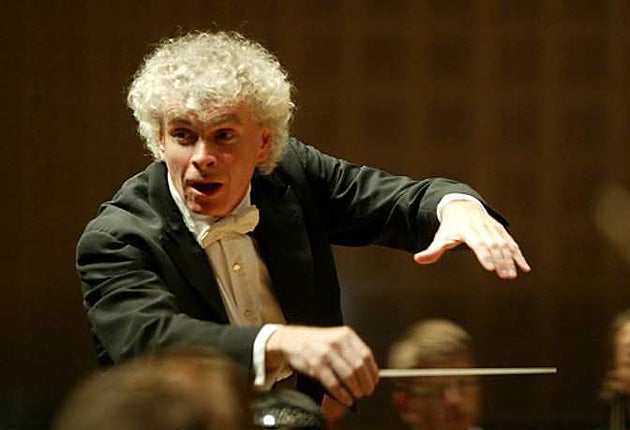Prom 64: Berlin Philharmonic ORchestra/Rattle, Royal Albert Hall, London
Rattle returns to a love-in

Your support helps us to tell the story
From reproductive rights to climate change to Big Tech, The Independent is on the ground when the story is developing. Whether it's investigating the financials of Elon Musk's pro-Trump PAC or producing our latest documentary, 'The A Word', which shines a light on the American women fighting for reproductive rights, we know how important it is to parse out the facts from the messaging.
At such a critical moment in US history, we need reporters on the ground. Your donation allows us to keep sending journalists to speak to both sides of the story.
The Independent is trusted by Americans across the entire political spectrum. And unlike many other quality news outlets, we choose not to lock Americans out of our reporting and analysis with paywalls. We believe quality journalism should be available to everyone, paid for by those who can afford it.
Your support makes all the difference.They should have headlined this programme "All You Need Is Love". That would have gone down well in Liverpool – European Capital of Culture – where Simon Rattle is taking the Berlin Philharmonic to meet his other extended family. As for the Proms, well, there's no doubting that this was the "love-in" of the season and if satisfaction really could be measured in the number of climaxes achieved in one evening it would be pretty unassailable. But that rather depends on how one views Messiaen's Turangalila Symphony – nirvana or just bad kama? Still, it was a smashing idea to have the source of its inspiration – Wagner's Tristan und Isolde – actually precede it for once. Now that's what I call foreplay.
So the love potion stealthily took effect in one of those miraculous Berlin Philharmonic pianissimos so beloved of Rattle. The sweetest of oboes then brought about the transformation into love at first sight and the Berlin strings did the rest. In a matter of minutes, Wagner's Prelude and Liebestod had established what this programme was all about – love sublimated in death; love transcendent. It was interesting to note the distinction that Rattle made between the feverish impulse of the prelude, its climax approached in almost reckless abandon, and the intensely harmonised sostenuto of the "love-death", soaring tremolando strings blazing a path to eternity.
Eighteen minutes then became eighty as Messiaen's hymn to love transcendent swooned and whooped its way from one tumultuous crescendo to the next. You have to listen to this work in the context of when it was written (1946/8); you have to understand it in terms of a devout Catholic's joy and gratitude at having survived wartime captivity. It was/is the product of a startlingly individual musical voice – but for me listening to Turangalila is like reliving my own musical coming of age and recalling those photographs of Messiaen in the flower-powered shirts which so typified the "make love, not war" philosophy of the hopeful 60's.
In short, the splashy, technicoloured vision of Turangalila has a naivety that is harder to swallow in these more cynical times. The lunar croonings of the ondes martenot ("ET in Love") now sound cheesily retrogressive and some of the themes – not least the all-pervasive "love theme" – would be met with derision if the composer were John Williams.
Still, if a case is to be made for Turangalila – and clearly it still has an adoring audience – then it could hardly be better made than by this orchestra and this conductor. Together with the amazing keyboard-stretching virtuosity of Pierre-Laurent Aimard, they performed feats of virtuosity that you could only begin to appreciate by looking at a score and seeing for yourself the terrifying rhythmic complexities and hard-to-achieve trumpet-topped unisons that only make their effect when interlocked and confidently dispatched with perfect unanimity.
Just hearing the Berliners negotiate the cosmic knees-up of "Joy of the Blood of the Stars" (the title alone sounds like the by-product of too many magic mushrooms) was pretty jaw-dropping, the crassest of tunes combusting in an amazing display of orchestral fireworks and culminating in the mother of all tam-tam laden crescendos.
Rattle threatened to take the lid off the Albert Hall with that one, and having achieved the loudest sound of the evening he then searched for the softest. "Garden of the Sleep of Love" (the aftermath of the magic mushrooms) brought cool, clear, droplets of piano and tinkling key glockenspiels against the shimmer of vibraphone. Messiaen's very own fragrance.
And there was plenty more where that came from – music to inhale, to swoon to, to exult in. But I gave my flowered shirts to Oxfam and lurex really isn't my style.
BBC Proms continue to 13 September (0845 401 5040)
Join our commenting forum
Join thought-provoking conversations, follow other Independent readers and see their replies
Comments